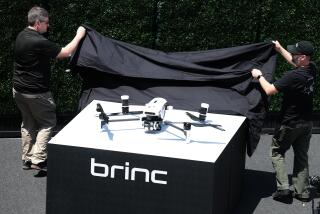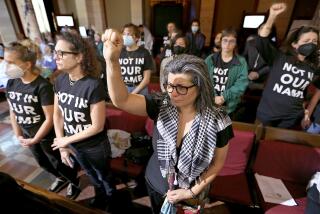City in Virginia passes anti-drone resolution
Charlottesville, Va., has taken action against the use of police spy drones, ordering a two-year moratorium on the citywide use of unmanned aircraft.
It is the first city in the nation to do so, supporters say, and its move may prompt other municipalities to act.
Seeking tough regulation over the future use of civilian drones in U.S. airspace, the City Council passed a resolution that prohibits police agencies from utilizing drones outfitted with anti-personnel devices such as Tasers and tear gas.
It also sought to block governments from using data recorded via police spy drones in criminal prosecutions.
By a 3-2 vote, the council Monday adopted a resolution drafted by the Rutherford Institute, a civil liberties organization based in Charlottesville. It recommended that the state and federal government follow suit. City officials said anti-drone measures are winning support in the Virginia General Assembly, or legislature.
âThis is the beginning of a movement,â said John W. Whitehead, president of the institute. âWe think cities around the country will be adopting this resolution.â
Charlottesville, with a population of about 43,500, is located about 120 miles southwest of Washington, D.C., and is home to the University of Virginia.
The measure comes in response to last yearâs congressional mandate to integrate the nationâs airspace with robotic aircraft by September 2015. The Federal Aviation Administration is working on regulations to accomplish this goal.
Charlottesville Mayor Satyendra Singh Huja said federal law would trump the cityâs resolution, but the council pushed ahead anyway.
âWe cannot make federal law,â he said. âWe can only make resolutions, so thatâs what we did.â
Drones currently are not allowed to fly in the U.S. except with special permission from the FAA, which many police agencies across the nation have obtained.
The drones used are small â typically 50 pounds or less â and resemble childrenâs toys more than the MQ-1 Predator and MQ-9 Reaper drones hunting Al Qaeda in the Middle East. But some of the drones can be armed with nonlethal weapons like bean bag guns or sound cannons, which is why the Rutherford Institute said it drafted the resolution.
Many civilian uses of drones are under discussion. Utility companies believe that they can help monitor oil, gas and water pipelines. Farmers think drones could aid in spraying their crops with pesticides. Drones helped measure radiation during Japanâs 2011 nuclear reactor meltdown.
Gretchen West, executive vice president of the Assn. for Unmanned Vehicle Systems International, a robotic technology trade group, said Virginia would be making a mistake if it passed a moratorium.
âIf Virginia passes a moratorium, the state could lose out on capturing hundreds, and perhaps thousands, of new jobs that will be created as the technology expands,â she said. âA moratorium would also unnecessarily limit the ability of police, firefighters and other first responders to do what they do best â keep the public safe from harm.â
ALSO:
Boeing sues Russian, Ukrainian partners for $355 million
British troops use mini-drones to find targets on the battlefield
Daredevil went faster than previously thought during 24-mile fall
More to Read
Inside the business of entertainment
The Wide Shot brings you news, analysis and insights on everything from streaming wars to production â and what it all means for the future.
You may occasionally receive promotional content from the Los Angeles Times.











